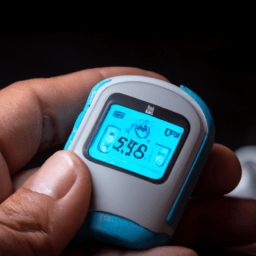Can Pulse Oximeter detect sleep apnea
A pulse oximeter can detect sleep apnea by measuring the oxygen saturation levels in the blood during sleep. During sleep apnea, the airway becomes partially or completely blocked, leading to a decrease in oxygen levels in the blood. A pulse oximeter can detect this decrease in oxygen levels and alert the user to the presence of sleep apnea. However, it is important to note that a pulse oximeter alone cannot diagnose sleep apnea and a medical professional should be consulted for proper diagnosis and treatment.
Can Pulse Oximeter detect sleep apnea?
Sleep apnea is a common sleep disorder that affects millions of people worldwide. It is characterized by pauses in breathing or shallow breathing during sleep, which can lead to a variety of health problems, including high blood pressure, heart disease, and stroke. One of the most common ways to diagnose sleep apnea is through a sleep study, which typically involves spending a night in a sleep lab while being monitored by a variety of sensors and equipment. However, some people wonder if a pulse oximeter can detect sleep apnea.
What is a pulse oximeter?
A pulse oximeter is a small device that clips onto your finger and measures your blood oxygen saturation levels. It works by shining a light through your finger and measuring the amount of light that is absorbed by your blood. This information is then used to calculate your oxygen saturation levels. Pulse oximeters are commonly used in hospitals and clinics to monitor patients who are undergoing surgery or who have respiratory problems.
How does sleep apnea affect blood oxygen levels?
During sleep apnea, the airway becomes partially or completely blocked, which can cause a decrease in blood oxygen levels. This decrease in oxygen levels can trigger the body to wake up briefly to resume breathing, which can disrupt sleep and lead to daytime fatigue. Over time, sleep apnea can also lead to more serious health problems, such as high blood pressure, heart disease, and stroke.
Can a pulse oximeter detect sleep apnea?
While a pulse oximeter can measure blood oxygen levels, it is not typically used to diagnose sleep apnea. This is because sleep apnea is a complex disorder that involves more than just changes in blood oxygen levels. A diagnosis of sleep apnea usually requires a comprehensive sleep study that involves monitoring a variety of physiological parameters, including brain waves, eye movements, muscle activity, and heart rate.
However, some studies have suggested that pulse oximetry can be used as a screening tool for sleep apnea. For example, a study published in the Journal of Clinical Sleep Medicine found that a combination of pulse oximetry and a questionnaire was effective in identifying patients with sleep apnea. Another study published in the Journal of Clinical Monitoring and Computing found that pulse oximetry was a reliable way to detect sleep apnea in patients undergoing surgery.
Conclusion
While a pulse oximeter can measure blood oxygen levels, it is not typically used to diagnose sleep apnea. A diagnosis of sleep apnea usually requires a comprehensive sleep study that involves monitoring a variety of physiological parameters. However, pulse oximetry may be a useful screening tool for sleep apnea, particularly when combined with other diagnostic tests.
| Pros | Cons |
|---|---|
| Pulse oximetry is a non-invasive and painless way to measure blood oxygen levels. | Pulse oximetry alone is not sufficient to diagnose sleep apnea. |
| Pulse oximetry may be a useful screening tool for sleep apnea. | A comprehensive sleep study is required to diagnose sleep apnea. |
| Pulse oximetry can be used to monitor patients with respiratory problems. | Pulse oximeters can be expensive and may not be covered by insurance. |
| By www.zelect.in | |
Sharing is caring!
Facebook Twitter Email
Recommended articles for Pulse Oximeter
Pulse Oximeter types and buying guide
-
Pulse oximeter buying guide. How to choose the right oximeter
-
What is a Pulse Oximeter
-
What are the Pulse Oximeter types. Which one is best?
-
What is the normal oxygen saturation on Pulse Oximeter
-
Which brand is best for Pulse Oximeter India
-
Does a Pulse Oximeter measure blood pressure
-
Does a Pulse Oximeter measure heart rate
-
Does Apple watch have Pulse Oximeter
-
How accurate is a Pulse Oximeter
-
What are the 2 readings on a Pulse Oximeter
-
Which finger to use for Pulse Oximeter
-
What does a Pulse Oximeter measure
-
What is a normal oxygen saturation reading on Pulse Oximeter
-
Can Pulse Oximeter detect sleep apnea


